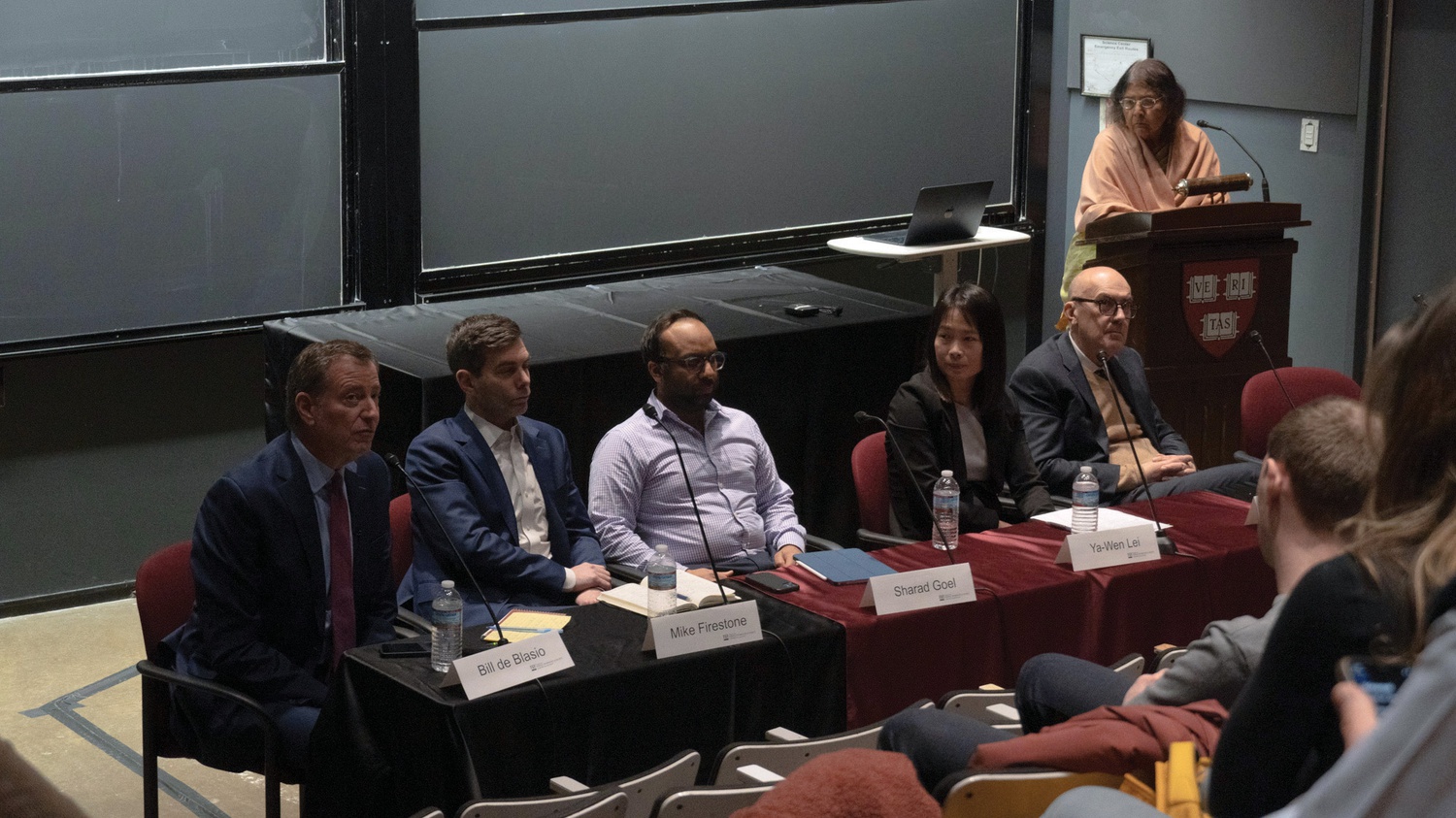
News
Summers Will Not Finish Semester of Teaching as Harvard Investigates Epstein Ties

News
Harvard College Students Report Favoring Divestment from Israel in HUA Survey

News
‘He Should Resign’: Harvard Undergrads Take Hard Line Against Summers Over Epstein Scandal

News
Harvard To Launch New Investigation Into Epstein’s Ties to Summers, Other University Affiliates

News
Harvard Students To Vote on Divestment From Israel in Inaugural HUA Election Survey
Bill de Blasio Discusses Artificial Intelligence Pitfalls in Harvard Kennedy School Lecture

Former New York City Mayor Bill de Blasio discussed the impacts of artificial intelligence on cities at a lecture Tuesday hosted by the Harvard Kennedy School’s Program on Science, Technology, and Society.
The talk — titled “AI for Cities or Cities for AI: Who Should Decide?” — also featured a panel consisting of Mike B. Firestone ’05, City of Boston Chief of Policy and Strategic Planning; Sharad Goel, professor at the Kennedy School; Antoine Picon, professor at the Graduate School of Design; and Ya-Wen Lei, professor of Sociology.
The discussion, part of STS’s “Science & Democracy” lecture series, was moderated by Sheila S. Jasanoff ’64, director of the STS program, and was co-sponsored by the Harvard University Center for the Environment and the Weatherhead Center for International Affairs.
To frame his discussion, de Blasio criticized the lack of discourse surrounding the pitfalls of AI, challenging the “almost-classic American sense” that technological development is “inherently good.”
“The question I always ask is: are the problems that AI will solve greater than the problems that it will create? It’s not a novel thought, but it is absent — too absent — in so much of our public discourse,” he said.
To illustrate his point, de Blasio listed potential dangers of the deployment of AI systems, including misinformation through deepfakes, adverse educational consequences of ChatGPT, and the dangers of a “powerful system falling in the wrong hands.”
“I’ve rarely seen anything even slightly as important as this go so undiscussed in the official discourse,” he said, referring to these issues.
De Blasio presented recommendations for government action on these dangers, including implementing licensing regulations, creating a legal liability structure, introducing product safety requirements, and holding congressional hearings on a regular basis to “shine a light.”
Above all, though, society must address the false “feeling of inevitability” surrounding the issue of AI, per de Blasio.
“These potential negative outcomes are not inevitable. They’re simply not inevitable,” he said.
“They are very advanced in my view, and troubling, but not inevitable. And when we think they’re inevitable, we are losing as the human race, and when we think they are not inevitable, we are self-empowering,” de Blasio added.
During the panel discussion following de Blasio’s speech, Goel, the Kennedy School professor, spoke about the difficulties of accounting for inherent bias in algorithms while also optimizing for efficiency.
He described one of his past projects, an app that helps people obtain transportation to go to court. Goel pointed out the difficulty of both maximizing the number of people helped while ensuring even representation across different neighborhoods.
“This really highlights one of the challenges of this technocracy, where people like myself often will go in, and we’ll design these algorithms without – in the worst of cases — consulting people,” Goel said.
“Even when we do try to consult people, we end up with this vast variance,” he added.
In an interview after the event, Firestone, the Boston city administrator, reaffirmed the need for municipal governments to regulate emerging technologies.
“The city needs to take a really people-centered approach to this new technology. Boston is going to be a place where great innovation happens, but our job here is to look out for our residents,” he said.
—Staff writer Sabrina R. Hu can be reached at sabrina.hu@thecrimson.com. Follow her on Twitter @sxbrinahhu.
—Staff writer Neil H. Shah can be reached at neil.shah@thecrimson.com. Follow him on Twitter @neilhshah15.
Want to keep up with breaking news? Subscribe to our email newsletter.
